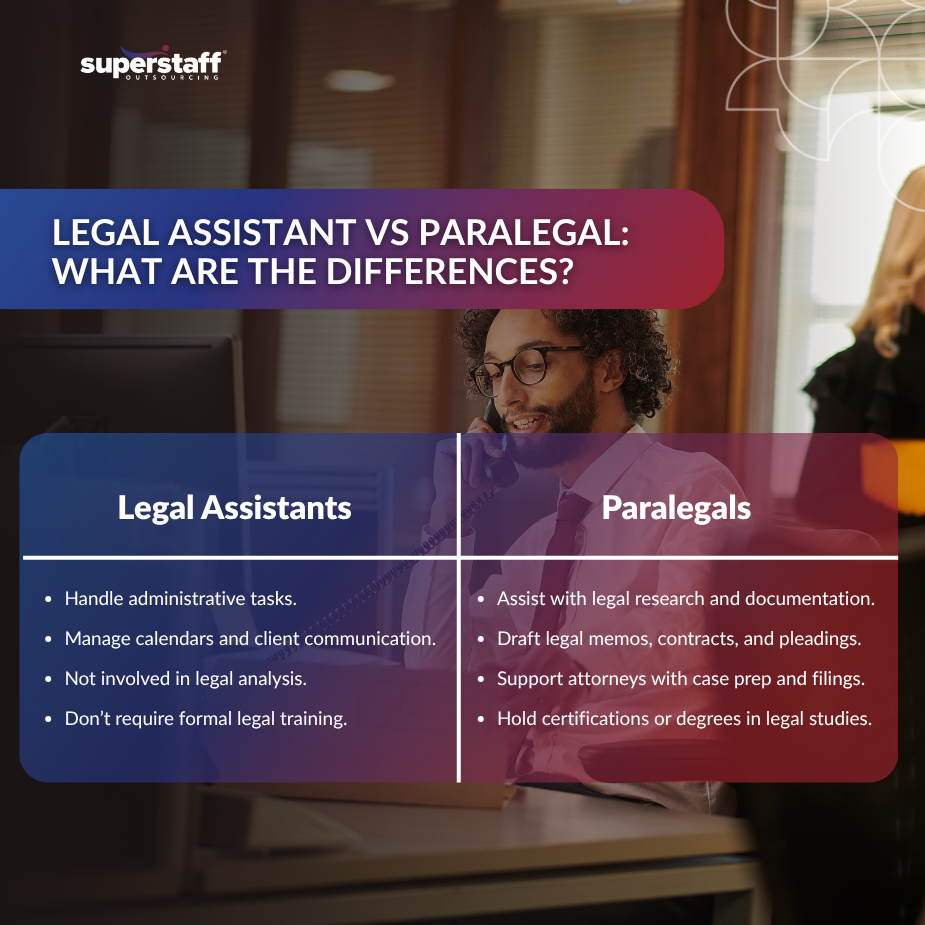
In the legal world, precision matters—even when defining roles. A seemingly small misunderstanding between a legal assistant and a paralegal can lead to misaligned tasks, inefficiencies, or even compliance issues. While both positions provide crucial support to attorneys, they are not interchangeable.
When comparing a legal assistant vs paralegal, it’s important to understand that each brings a distinct set of skills and responsibilities to the table. Legal assistants typically focus on administrative duties that keep day-to-day operations running smoothly, while paralegals are trained to assist with more substantive legal work such as case research, drafting legal documents, and preparing for trial.
Legal Assistant vs Paralegal: Roles in a Law Firm
This blog will explore the differences between the two roles, highlighting the duties of a paralegal, legal assistant responsibilities, and the advantages of outsourcing each role. We’ll also look at how legal teams can benefit from clearly defining these positions, especially when scaling through legal process outsourcing (LPO).
Legal Assistants Focus on Administrative Support
When considering legal assistant vs paralegal roles, it’s clear that both provide crucial support to attorneys, but they are not interchangeable.
Legal assistants play a vital role in maintaining order in busy law firms. Their day-to-day tasks ensure that attorneys have the bandwidth to focus on legal strategy and client needs. From managing schedules to organizing files, legal assistants are the operational backbone of many legal teams.
Legal assistant responsibilities typically include:
- Answering client phone calls and responding to basic inquiries
- Managing attorney calendars and scheduling meetings or court appearances
- Drafting non-legal correspondence like cover letters and memos
- Filing documents and managing case-related paperwork
Unlike paralegals, legal assistants are not expected to conduct legal research or interpret legal documents. Their primary contribution lies in streamlining office workflows and ensuring smooth communication between clients and legal professionals.
By contrast, paralegals dig deeper into a case’s legal substance. Understanding the distinction in the legal assistant vs paralegal debate helps firms assign responsibilities more effectively and compliantly.
Paralegals Handle Substantive Legal Work
Paralegals perform more complex, substantive tasks under attorney supervision.
Often considered the legal profession’s behind-the-scenes analysts, paralegals provide research and documentation that form the foundation of a case. They typically have formal training or certification in legal studies and are skilled in understanding the nuances of legal proceedings.
Common duties of a paralegal include:
- Conducting legal research and summarizing case law
- Drafting pleadings, motions, and legal memoranda
- Preparing trial exhibits and organizing discovery documents
- Reviewing contracts and assisting in due diligence
Paralegals often work closely with attorneys during litigation, corporate transactions, or regulatory investigations. In many firms, they are entrusted with preparing the legal groundwork, which attorneys then use to build arguments and advise clients.
Understanding these differences is crucial when structuring your legal team or outsourcing support roles. These distinct tasks further illustrate the key differences in the legal assistant vs paralegal dynamic.

Role Clarity Matters More Than Ever
When it comes to legal assistant vs paralegal titles, responsibilities can vary by firm and state, making clarity even more important.
It’s not uncommon for firms to blur the lines between the two roles, assigning paralegal-level work to legal assistants or vice versa. However, this ambiguity can cause operational inefficiencies and even violate state laws or ethical guidelines, particularly if someone without proper training handles substantive legal work.
Both the National Federation of Paralegal Associations (NFPA) and the American Bar Association (ABA) offer definitions and professional standards for these roles.
Key distinctions to remember:
- Legal assistants focus on clerical and administrative tasks.
- Paralegals engage in legal analysis and documentation.
- Some jurisdictions require certified paralegals for specific responsibilities.
Clarifying these roles:
- Improves delegation and workflow
- Reduces the risk of malpractice
- Ensures proper use of billing codes (important for client transparency and firm revenue)
That clarity becomes especially valuable when outsourcing legal functions.
Outsourcing Unlocks Efficiency and Scalability
Outsourcing legal assistants and paralegals offers cost efficiency, flexibility, and access to skilled support.
Legal process outsourcing (LPO) allows law firms and in-house legal departments to streamline operations by tapping into global talent pools. Offshore professionals, especially those based in the Philippines, India, and Latin America, are trained to support U.S. legal practices and offer 24/7 assistance thanks to time zone advantages.
Outsourced legal assistant responsibilities may include:
- Calendar management and meeting coordination
- Organizing electronic case files
- Proofreading and formatting legal correspondence
- Supporting client intake and follow-up
Outsourced duties of a paralegal include:
- Conducting document review and legal research
- Drafting standard legal documents and contracts
- Managing e-discovery platforms
- Assisting with compliance and regulatory filings
When done right, outsourcing reduces overhead without compromising quality. It enables firms to:
- Scale legal operations without expanding office space
- Delegate routine work to skilled professionals
- Increase responsiveness and reduce turnaround times
But outsourcing success depends on choosing the right partner and support model.
How SuperStaff Supports Your Legal Operations
Whether you’re exploring legal assistant vs paralegal outsourcing for the first time or looking to expand your existing team, SuperStaff can help. SuperStaff offers specialized LPO solutions tailored to your firm’s needs.
Whether you need a virtual legal assistant to organize client communications or a trained paralegal to manage research and documentation, SuperStaff provides a scalable solution that integrates seamlessly with your internal team.
Our legal outsourcing services include:
- U.S.-trained legal support professionals
- Dedicated or blended team structures
- Secure infrastructure and strict data confidentiality protocols
With a deep understanding of U.S. legal workflows and compliance requirements, SuperStaff ensures that your offshore legal team operates with the same precision and reliability as your in-house staff.
A mid-sized litigation firm partnered with SuperStaff to outsource its case preparation tasks. By delegating legal research and document review to offshore paralegals, the firm reduced turnaround time by 30% and saved 40% in operational costs.
Whether you’re scaling your practice or streamlining operations, we make it easier to grow smart.
Legal Assistant vs Paralegal: A Strategic Approach to Legal Support
Understanding the difference between legal assistants and paralegals is essential—especially in the ongoing legal assistant vs paralegal discussion that affects staffing and compliance.
Legal assistants offer indispensable administrative support that keeps legal operations running smoothly, while paralegals take on more complex, substantive legal work that directly supports litigation, compliance, and case resolution. Clearly defining these roles within your team helps avoid task overlap, ensures proper delegation, and minimizes the risk of compliance breaches or inefficiencies.
In today’s fast-paced legal environment, outsourcing either or both roles can serve as a smart, strategic move. It not only enhances agility and reduces operational costs but also boosts overall performance by allowing attorneys to focus on higher-value legal tasks.
Ready to build a high-performing legal support team offshore? Partner with SuperStaff for reliable, expert legal process outsourcing tailored to your firm’s unique needs.






